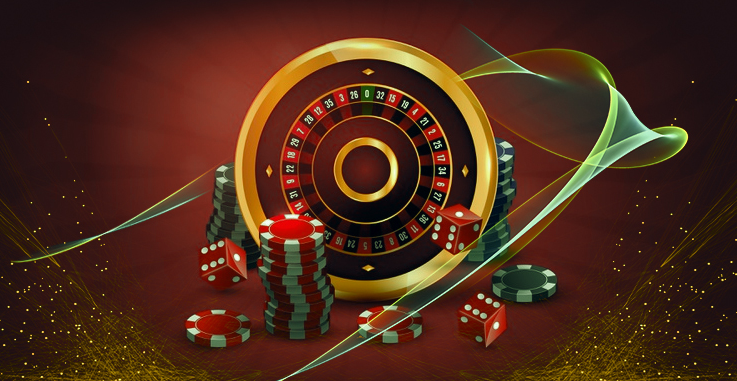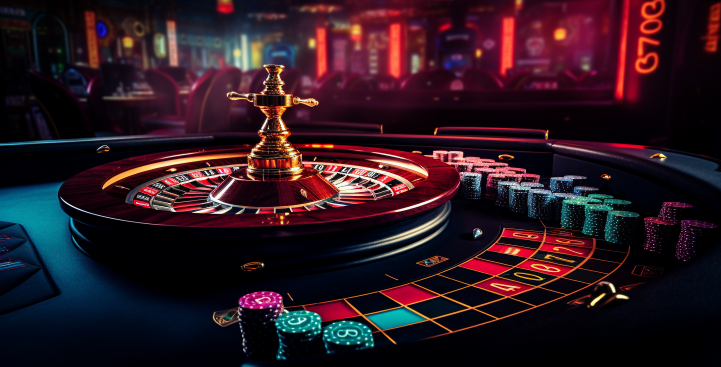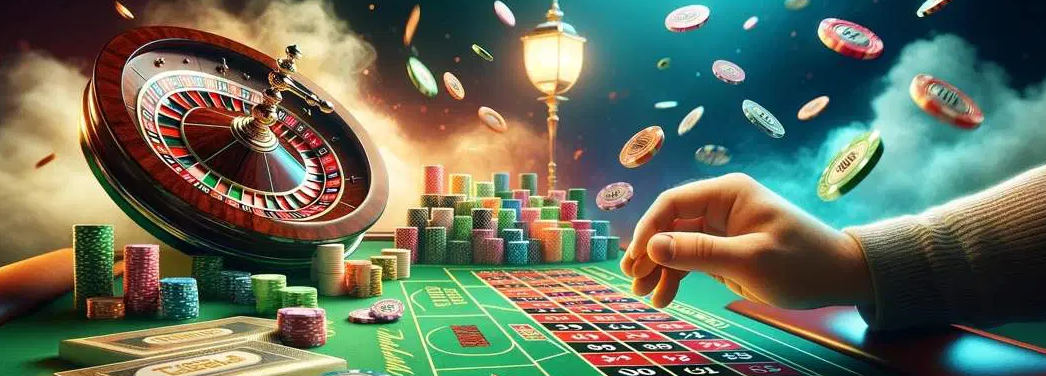Roulette, a game that has captivated players around the world for centuries, has a rich history that spans from its early beginnings in European salons to its prominent place in modern-day online casinos. Whether you’re playing in a glamorous land-based casino or spinning the wheel from the comfort of your home, the history of roulette is a testament to its enduring popularity and adaptability.
The history of roulette is a captivating journey that spans centuries, weaving through the elegant salons of Europe to the vibrant digital platforms of today’s online casinos. This iconic game, synonymous with chance and excitement, has evolved dramatically while retaining its core allure. From its accidental origins to its modern incarnations, the roulette game timeline reflects a blend of mathematical ingenuity, cultural influence, and technological advancement. In this exploration, we trace the origin of roulette, its transformation through time, and its enduring appeal as a timeless casino game.
French Roulette Origins
The story of French roulette origins begins in the intellectual and cultural hub of 17th-century France. The game’s roots are often linked to the pursuit of scientific discovery, with the roulette wheel emerging as an unintended byproduct of a quest for perpetual motion. The origin of roulette is steeped in the elegance of European gaming houses, where early versions of the game captivated aristocrats and intellectuals alike. These early iterations, played in the opulent settings of Parisian salons, laid the foundation for what would become a global phenomenon. The history of roulette owes much to these French beginnings, where chance and strategy converged to create a game of enduring fascination. Blaise Pascal roulette is often considered the precursor to the modern roulette wheel, as his work in probability theory inspired the development of the game.
The Role of Blaise Pascal in the Invention of Roulette
The origin of roulette can be traced back to the 17th century in France. Blaise Pascal, a renowned mathematician and physicist, is often credited with playing a pivotal role in the creation of the roulette wheel. Although he did not invent the game outright, his work in probability theory influenced the development of the roulette wheel. Pascal’s studies in mechanics and his quest to create a perpetual motion machine led to the early designs of the roulette wheel.
Many believe that Blaise Pascal roulette can be viewed as an early experiment in creating a game based on random chance. While Pascal’s machine was intended for scientific purposes, it would eventually evolve into the roulette wheel as we know it today.

The Birth of the Roulette Wheel
The roulette wheel invention was the result of many years of experimentation, but it gained widespread popularity in 18th-century France. The wheel initially consisted of 36 slots, with the numbers alternating between red and black. This marked the beginning of French roulette origins, which played a significant role in shaping modern roulette. French roulette was the first variant to introduce the numbers 0 through 36, with the single-zero layout becoming a hallmark of the game. The influence of these early designs would spread across Europe and beyond, cementing roulette as a game of chance that players would continue to enjoy for centuries. The debate between classic vs modern roulette revolves around the differences in wheel design, betting options, and house edges, with each version offering a distinct experience. The debate between classic vs modern roulette revolves around the differences in wheel design, betting options, and house edges, with each version offering a distinct experience.
Central to the narrative of French roulette origins is the figure of Blaise Pascal, a brilliant French mathematician, physicist, and philosopher. The connection between Blaise Pascal and roulette is not one of deliberate design but rather a serendipitous outcome of his scientific endeavors. In the mid-17th century, Pascal sought to create a perpetual motion machine—a device that could operate indefinitely without an external energy source. His experiments with a spinning wheel, designed to test theories of motion and probability, inadvertently gave rise to the roulette wheel’s prototype. While Pascal’s machine failed to achieve perpetual motion, it inspired the creation of a gambling device that would become iconic. The roulette wheel invention, though accidental, marked a pivotal moment in the history of roulette, blending mathematical precision with the thrill of chance.
Evolution of Roulette Through the Centuries
Roulette, one of the most iconic casino games, has a rich and fascinating history that spans several centuries. From its early origins in 17th-century France to its transformation in glamorous European casinos and bustling Las Vegas halls, the game has continuously evolved in both form and popularity.
Over time, various versions such as European, American, and French roulette emerged, each with unique features and odds. With the rise of online casinos in the 21st century, roulette entered a new digital era, making it more accessible than ever. This article explores the journey of roulette through the ages, highlighting key developments and cultural influences that shaped the game we know today.
The Impact of Gambling Regulations on Roulette
As roulette gained popularity in European salons, the game also began to encounter various forms of regulation. In the early 19th century, gambling laws in France began to shape the way roulette was played. The game continued to evolve as it spread across Europe, and its inclusion in casinos around the world further diversified its rules and variations. Online vs land-based roulette offers different advantages, with online play providing convenience and variety, while land-based casinos offer a more immersive and traditional atmosphere.
The evolution of roulette was also influenced by the introduction of new rules and the development of competing casino variants. The game’s spread to other countries, including the United States, brought about new adaptations, such as the inclusion of a double-zero pocket, which significantly altered the odds of winning. These changes were essential in shaping the modern versions of roulette that players encounter today.
Classic vs. Modern Roulette
Roulette has stood the test of time, but its style and format have evolved significantly from the elegant salons of 18th-century Europe to today’s fast-paced digital platforms. Classic roulette, with its traditional wheel, croupier, and luxurious casino ambiance, emphasizes the charm and ritual of the game.
In contrast, modern versions — including online, live dealer, and even VR roulette — bring innovation, convenience, and new betting features to the table. In this article, we’ll explore the key differences between classic and modern roulette, comparing the gameplay experience, technology, and appeal to different types of players.

Differences Between European and American Roulette
One of the major differences in roulette variants is the classic vs. modern roulette debate, particularly when comparing European and American roulette. The classic version, European roulette history, features a single zero pocket, while the American version introduces an additional double zero. This seemingly small difference dramatically affects the house edge, with European roulette offering a lower house edge (2.7%) compared to the American version (5.26%).
Players often debate the merits of each version, but European roulette remains a favorite for many due to its better odds. The difference in rules is crucial for those seeking to optimize their chances in the game. With its deep historical roots and strategic allure, European roulette history continues to captivate players worldwide.
Online vs. Land-Based Roulette
The debate between online and land-based roulette continues to captivate both new and seasoned players. Traditional brick-and-mortar casinos offer a unique, immersive experience with the atmosphere of real tables, spinning wheels, and live interaction.
On the other hand, online roulette brings unmatched convenience, allowing players to enjoy the game anytime, anywhere — often with added features like game variations, faster rounds, and attractive bonuses. This article compares the pros and cons of each format, helping you decide which version of roulette best suits your playing style and preferences.
Roulette’s Transition to Online Casinos
With the technological evolution of roulette came the rise of online casinos, which brought the game to a global audience. The roulette game timeline has taken a significant turn in the 21st century, with online platforms offering virtual roulette tables where players can enjoy the game from the comfort of their own homes. The ability to play roulette in online casinos has dramatically expanded the reach of the game, allowing enthusiasts from all corners of the world to participate.
The transition from traditional land-based casinos to online platforms has introduced players to new innovations, such as live dealer roulette and mobile-compatible versions. The benefits of playing online vs. land-based roulette are numerous, including the convenience of playing anytime and anywhere, as well as the variety of betting options available. In the 18th century, roulette in European salons was a popular pastime for the elite, where the game’s early forms were enjoyed in luxurious settings.
Why Roulette Remains a Timeless Casino Game
Roulette has maintained its allure for centuries, and despite the changes and innovations in the casino world, the game’s core principles remain the same. The combination of chance and strategy, along with the dramatic wheel spins and the anticipation of the ball landing on a number, ensures that roulette continues to be a top attraction for casino players.
The roulette development throughout history is a testament to its lasting appeal. As the game has evolved and adapted to new technologies, it has managed to preserve the excitement and thrill that players have enjoyed for generations. Whether in roulette in European salons of the past or roulette in online casinos today, it remains a timeless game of chance that players continue to flock to.
From its French roulette origins to the modern online platforms of today, roulette’s story is one of growth and innovation. It is a game that transcends time and place, making it a staple in the world of casino gaming. Whether you prefer the classic European version or enjoy the benefits of online roulette, there’s no denying that the game’s enduring legacy will continue to thrill players for years to come.


